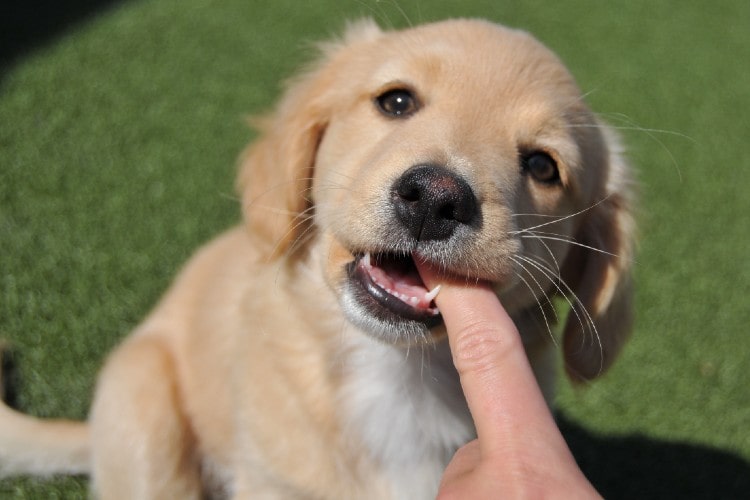Just like humans, young dogs have a temporary set of baby teeth that loosen and fall out as their permanent adult teeth gradually grow in to replace them. That being the case, you may be wondering if puppies don’t keep the teeth they’re born with, when do puppies lose their baby teeth? How do I know when my puppy is teething? And what can I do to help? Read on to learn more about what to expect about dentition as puppies grow.
What are baby teeth?
Baby teeth, also called deciduous teeth, are the first set of teeth to emerge in young puppies. They appear similar in shape to their corresponding adult teeth but are usually smaller in size. Most puppies will have 28 baby teeth in total, which are replaced by 42 adult teeth as the puppy grows.1
When do baby teeth first emerge in puppies?
Puppies are born without any teeth, but their baby teeth begin to emerge after only a few weeks. Puppies have different types of teeth that grow in at specific times. Incisors, which are the small teeth at the very front of the mouth, begin growing in at 4-6 weeks of age. Canines, which are the long, sharp teeth behind the incisors, begin growing in at 3-5 weeks of age. Premolars, which are the shorter, ridged teeth on the sides of the mouth behind the canines, begin growing in at 5-6 weeks of age. All baby teeth should be completely grown in once a puppy is about 6-8 weeks old.2
When do dogs lose their baby teeth?
Dogs begin losing their baby teeth once they are 12-16 weeks (3-4 months) of age.3 Since small breeds may mature earlier than large breeds, small breed puppies may begin losing their baby teeth slightly earlier than large breed puppies, and they may have all their adult teeth grown in slightly earlier as well.4 However, the general timeline still applies.
At what age should a dog have lost all of its baby teeth?
By 6-7 months of age, most puppies should have lost all of their baby teeth, and their adult teeth should be fully grown in to replace them. Adult teeth are generally larger and less sharp than baby teeth. Most dogs will have a total of 42 adult teeth, including incisors, canines, premolars, and molars.5
What are signs that a dog is teething?
Multiple signs can indicate teething in puppies. Teething dogs commonly chew on anything and everything, including their toys, your hands, and household items. You may notice that your puppy becomes more mouthy than usual, and you may even see or feel loose teeth in your puppy’s mouth.6 Another sign of teething may be a small amount of bleeding at the site of a loose or lost tooth; you may notice scant blood in your puppy’s mouth or on items that they have been chewing. Additionally, while it is common (and safe) for puppies to swallow their baby teeth once they fall out, you may find lost baby teeth in areas where your puppy spends time. Teething puppies also often experience discomfort as their adult teeth erupt through the gums to replace the baby teeth. Therefore, they may be hesitant to eat or more sensitive around their mouth area. They may be nippy or whine or cry more frequently.7
What can I do to help my teething puppy?
Since teething puppies are inclined to chew, you may offer your puppy cloth or soft rubber toys that can’t be easily destroyed, but that will be gentle on the gums. Remove any toys that may be too hard or damaging. Also, since teething often involves gum discomfort, you may offer refrigerated or frozen items such as carrots or Kong toys, which soothe the inflamed gums as the dog chews. You should discourage puppies from chewing your hands/body, as this behavior will become undesirable as they grow into adult dogs.8 Additionally, be sure to puppy-proof the environment well, and do not allow chewing on inappropriate or dangerous household items. Puppies should be redirected to an approved chew toy instead.9
What if a baby tooth doesn’t fall out?
A baby tooth that doesn’t fall out by the time a puppy is 6-7 months old is called a retained deciduous tooth. Sometimes, these retained baby teeth just need more time and will fall out in a few more weeks to months. Teeth that are retained past 1 year of age, however, usually do not fall out unaided. Because these retained baby teeth can prevent normal eruption and positioning of the surrounding adult teeth, and because tartar often accumulates in the space between a baby tooth and its associated adult tooth, removal of the retained baby tooth is usually recommended.10 This may be performed at the time of a puppy’s spay or neuter surgery, or at the time of a dental cleaning. Brushing your pup’s teeth daily can help to minimize tartar accumulation in the meantime.11
Article Sources
Pets Digest uses only high-quality sources, including peer-reviewed studies, to support the facts within our articles. Read our editorial process to learn more about how we fact-check and keep our content accurate, reliable, and trustworthy.
- Muylle S. Dental development of dogs. Msdvetmanual.com. Updated October 2020. Accessed August 2, 2022.
- Warren M. Understanding the puppy teething process. Markhamvetclinic.ca. Published November 15, 2021. Accessed August 2, 2022.
- Donovan L. A timeline of puppy teething. Akc.org. Published May 3, 2019. Accessed August 2, 2022.
- American Kennel Club. When will my dog’s permanent teeth come in? Akc.org. Published April 26, 2015. Accessed August 2, 2022.
- Hiscox L, Bellows J. Persistent deciduous teeth (baby teeth) in dogs. Vcahospitals.com. Accessed August 2, 2022.
- Williams K, Lerner R. Teeth, teething and chewing in puppies. Vcahospitals.com. Accessed August 2, 2022.
- Greencross Vets. Puppy teething. Greencrossvets.com.au. Accessed August 2, 2022.
- Meyers H. Puppy teething and nipping: a survival guide. Akc.org. Published January 1, 2022. Accessed August 2, 2022.
- Purina. Puppy teething advice. Purina.co.uk. Accessed August 2, 2022.
- Charlier C. Deciduous canine tooth removal in the dog. Todaysveterinarypractice.com. Published December 14, 2021. Accessed August 2, 2022.
- Bellows J, Berg ML, Dennis S, et al. 2019 AAHA dental care guidelines for dogs and cats. J Am Anim Hosp Assoc. 2019;55(2):49-69. doi:10.5326/JAAHA-MS-6933


